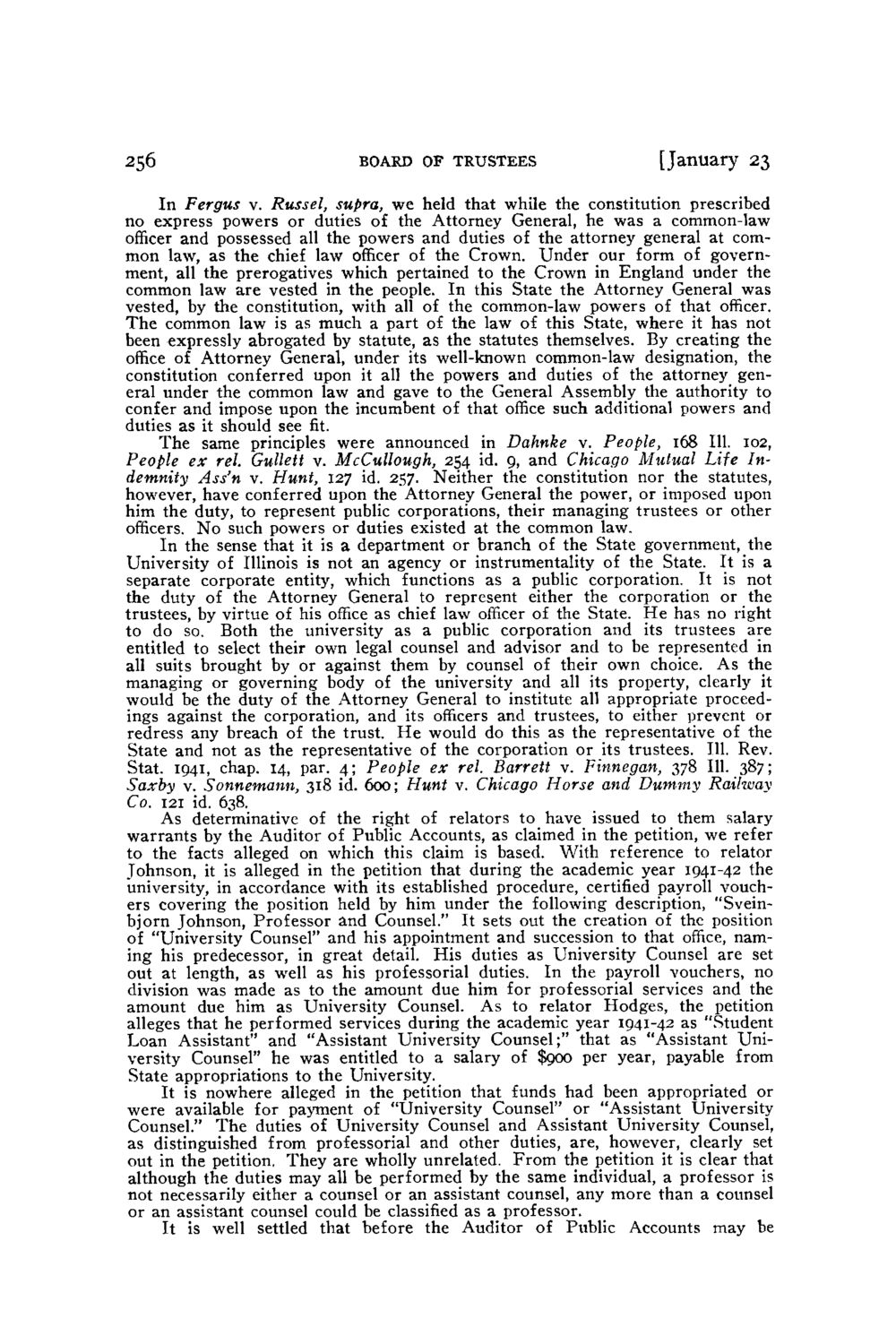| |
| |
Caption: Board of Trustees Minutes - 1944
This is a reduced-resolution page image for fast online browsing.

EXTRACTED TEXT FROM PAGE:
256 BOARD OF TRUSTEES [January 23 In Fergus v. Russel, supra, we held that while the constitution prescribed no express powers or duties of the Attorney General, he was a common-law officer and possessed all the powers and duties of the attorney general at common law, as the chief law officer of the Crown. Under our form of government, all the prerogatives which pertained to the Crown in England under the common law are vested in the people. In this State the Attorney General was vested, by the constitution, with all of the common-law powers of that officer. T h e common law is as much a part of the law of this State, where it has not been expressly abrogated by statute, as the statutes themselves. By creating the office of Attorney General, under its well-known common-law designation, the constitution conferred upon it all the powers and duties of the attorney general under the common law and gave to the General Assembly the authority to confer and impose upon the incumbent of that office such additional powers and duties as it should see fit. T h e same principles were announced in Dahnke v. People, 168 111. 102, People ex rel. Gullett v. McCullough, 254 id. 9, and Chicago Mutual Life Indemnity Ass'n v. Hunt, 127 id. 257. Neither the constitution nor the statutes, however, have conferred upon the Attorney General the power, or imposed upon him the duty, to represent public corporations, their managing trustees or other officers. No such powers or duties existed at the common law. In the sense that it is a department or branch of the State government, the University of Illinois is not an agency or instrumentality of the State. It is a separate corporate entity, which functions as a public corporation. It is not the duty of the Attorney General to represent either the corporation or the trustees, by virtue of his office as chief law officer of the State. H e has no right to do so. Both the university as a public corporation and its trustees are entitled to select their own legal counsel and advisor and to be represented in all suits brought by or against them by counsel of their own choice. As the managing or governing body of the university and all its property, clearly it would be the duty of the Attorney General to institute all appropriate proceedings against the corporation, and its officers and trustees, to either prevent or redress any breach of the trust. H e would do this as the representative of the State and not as the representative of the corporation or its trustees. 111. Rev. Stat. 1941, chap. 14, par. 4 ; People ex rel. Barrett v. Finnegan, 378 111. 387; Saxby v. Sonnemann, 318 id. 600; Hunt v. Chicago Horse and Dummy Railway Co. 121 id. 638. As determinative of the right of relators to have issued to them salary warrants by the Auditor of Public Accounts, as claimed in the petition, we refer to the facts alleged on which this claim is based. With reference to relator Johnson, it is alleged in the petition that during the academic year 1941-42 the university, in accordance with its established procedure, certified payroll vouchers covering the position held by him under the following description, "Sveinbjorn Johnson, Professor and Counsel." It sets out the creation of the position of "University Counsel" and his appointment and succession to that office, naming his predecessor, in great detail. His duties as University Counsel are set out at length, as well as his professorial duties. In the payroll vouchers, no division was made as to the amount due him for professorial services and the amount due him as University Counsel. As to relator Hodges, the petition alleges that he performed services during the academic year 1941-42 as "Student Loan Assistant" and "Assistant University Counsel;" that as "Assistant University Counsel" he was entitled to a salary of $900 per year, payable from State appropriations to the University. It is nowhere alleged in the petition that funds had been appropriated or were available for payment of "University Counsel" or "Assistant University Counsel." T h e duties of University Counsel and Assistant University Counsel, as distinguished from professorial and other duties, are, however, clearly set out in the petition, They are wholly unrelated. F r o m the petition it is clear that although the duties may all be performed by the same individual, a professor is not necessarily either a counsel or an assistant counsel, any more than a counsel or an assistant counsel could be classified as a professor. It is well settled that before the Auditor of Public Accounts may be
| |